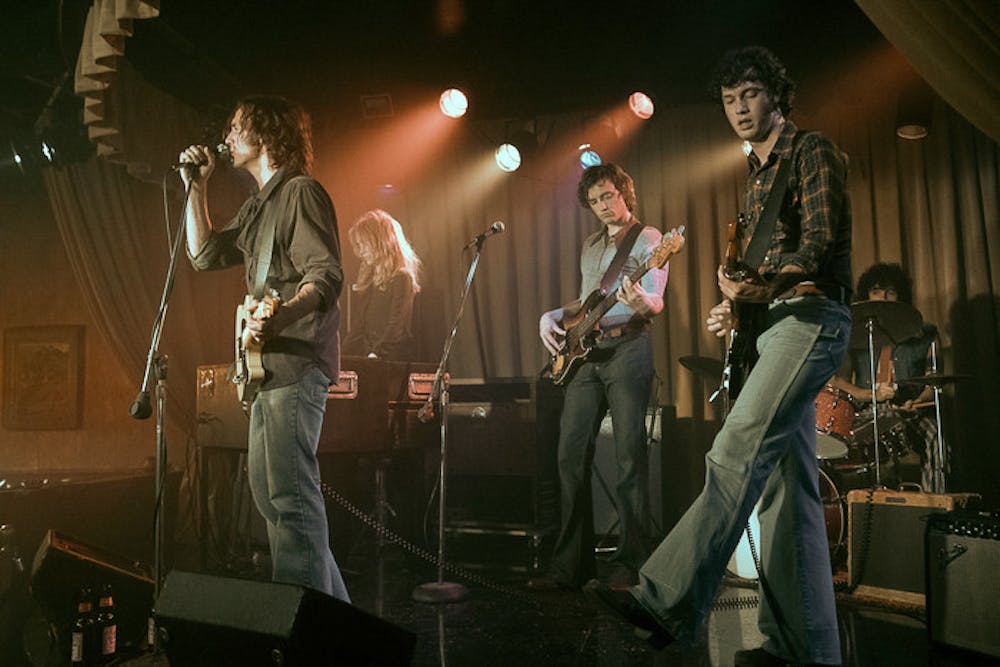Daisy Jones and the Six, the fictional band of Taylor Jenkins Reid’s 2019 eponymous novel has finally been given a voice. The band’s album “Aurora” was first concocted in the novel, an interview-style narrative that explores the band’s rise to fame decades after its abrupt split in the late 1970s. The record came off the pages Friday when it launched in tandem with the first three episodes of the new “Daisy Jones and the Six” series on Amazon Prime.
Throughout the book, Reid goes to great lengths to describe the musical quality of each song and even includes a full “Aurora” tracklist with accompanying lyrics. In an interview with Penguin Random House, Reid attributes her inspiration for the story to ’70s music icons. She explains that she “started with the germ of Stevie Nicks and Lindsey Buckingham,” which shaped the fictional group’s dynamics off of Fleetwood Mac.
The band’s lead musicians, Daisy Jones and Billy Dunne, are portrayed by actors Riley Keough and Sam Claflin. For their roles, Keough and Claflin underwent vocal and instrumental training to fully embody their characters instead of using body and voice doubles. Given the actors’ lack of prior musical experience, their performance on the album is commendable.
“Aurora” was produced by Blake Mills, whose recent projects include Marcus Mumford’s “Self-Titled” and Jack Johnson’s “Meet the Moonlight.” He enlisted the songwriting expertise of Mumford and other prominent artists like Jackson Browne and Phoebe Bridgers to craft the rock-style album.
Mills’s production stays true to the ’70s style, but the near-total abandonment of the book’s original songs and lyrics is wildly disappointing. Though creative flexibility can be expected when musicians are adapting a non-musician’s work, the departure from the fictional pieces translates into a loss of emotional and narrative integrity for fans of the novel.
The band offered a teaser of its discography with the release of two singles, which excited fans who were prepared to hear the songs they had been reading about finally come to life. But while both songs were technically included in the book, they stray from the original lyrics and meaning. “Regret Me,” the first single released Jan. 25, maintains the classic rock style that readers imagine Daisy Jones and the Six to produce, but the new words create a disconnect from the characters and have a sonically awkward flow.
The second single, “Look At Us Now (Honeycomb),” was released Feb. 15. The progression of the melody and the pre-bridge guitar solo echo Fleetwood Mac’s “The Chain.” In the book, the song is the band’s biggest hit, and although this is believable for the first three minutes of the song, it ends up devolving into a repetitive and seemingly never-ending loop that prompts listeners to skip to the next track.
The rest of the album delivered little improvement. The upbeat title track “Aurora” begins the album — in the novel, it is meant to be the foundation upon which the rest of the album is built. While the released track starts off maintaining its theme from the novel — having an anchor during tough times — the sound quickly becomes disorienting and hectic, and it is difficult to discern what it is supposed to be about near the end. The track that was supposed to be the band’s grand statement is nothing particularly memorable.
The next two songs, “Let Me Down Easy” and “Kill You To Try,” continue building on the album’s quick-tempo ’70s rock feel. The former’s percussion and the latter’s background vocals are once again reminiscent of Fleetwood Mac’s blues-rock style.
The album’s mood then shifts with “Two Against Three,” which helps round out the record despite not appearing in the novel. The song’s pace is much slower, featuring only Keough’s voice over a gentle guitar strum. The track allows Daisy’s fragile yet talented character to shine through at last, and it provides a refreshing mid-album rest from the first three songs.
“You Were Gone” continues the mellow atmosphere with a strong bridge and full-band harmony that also feels Fleetwood Mac-esque. It is followed by “More Fun to Miss,” whose bold and entertaining delivery from Keough makes it an interesting listen.
The lowest point of the album is “Please.” Its production feels out of place with the rest of the tracks and Claflin’s voice does not fulfill the powerful vocals needed for this type of song. While “Please” is from the book, it was supposed to be written by Daisy Jones and thus should have remained her song. Instead, the vocal perspective shifts to Billy and focuses on his struggles with addiction during the band’s tours. The album would have been better off completely nixing the song altogether.
The final two songs help close the album on a better note. Claflin and Keough’s voices play off each other well in “The River,” and their harmonies add a level of tension that is the hallmark of their characters’ relationship. The album closes with “No Words,” which provides a calming conclusion and delivers a goodbye from the fictional band that will never again reunite to create music.
The tracks themselves are catchy, but musically, they are nothing impressive. The producers and writers could have gotten away with this Fleetwood Mac imitation by sticking with the original songs. But by trying too hard to make it an entirely new record, “Aurora” comes across as a disappointing, wannabe rock album that leaves fans of the book confused and those unfamiliar with the source material unimpressed.
“Daisy Jones and the Six” has yet to make its final mark on the world. The show will continue to release episodes weekly on Amazon Prime Video, with the finale set to air on March 24.
Daphne is an Arts & Culture writer from Austin, Texas. She is planning on studying International and Public Affairs. Her passions include cats, running and Phoebe Bridgers.





